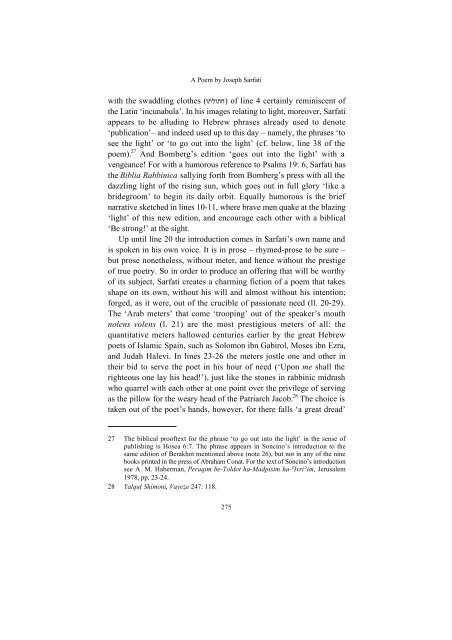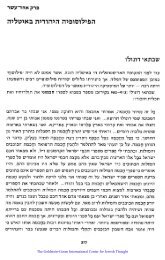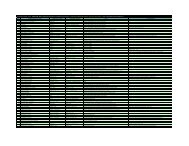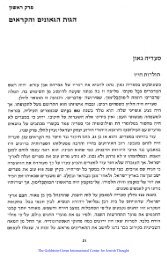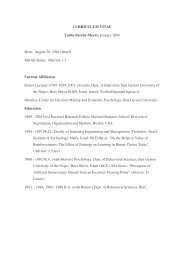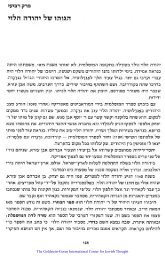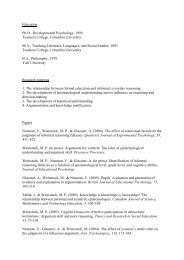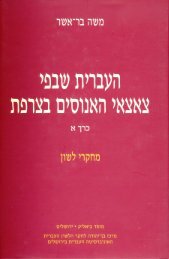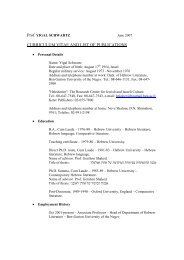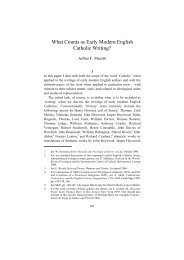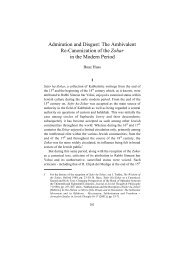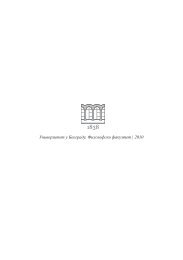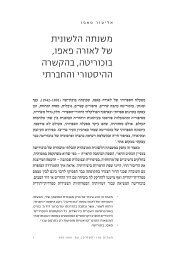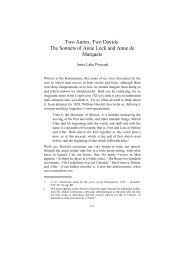A Poem by Joseph Sarfati in Honor of Daniel Bomberg's
A Poem by Joseph Sarfati in Honor of Daniel Bomberg's
A Poem by Joseph Sarfati in Honor of Daniel Bomberg's
You also want an ePaper? Increase the reach of your titles
YUMPU automatically turns print PDFs into web optimized ePapers that Google loves.
A <strong>Poem</strong> <strong>by</strong> <strong>Joseph</strong> <strong>Sarfati</strong><br />
with the swaddl<strong>in</strong>g clothes (חתולתו) <strong>of</strong> l<strong>in</strong>e 4 certa<strong>in</strong>ly rem<strong>in</strong>iscent <strong>of</strong><br />
the Lat<strong>in</strong> ‘<strong>in</strong>cunabula’. In his images relat<strong>in</strong>g to light, moreover, <strong>Sarfati</strong><br />
appears to be allud<strong>in</strong>g to Hebrew phrases already used to denote<br />
‘publication’– and <strong>in</strong>deed used up to this day – namely, the phrases ‘to<br />
see the light’ or ‘to go out <strong>in</strong>to the light’ (cf. below, l<strong>in</strong>e 38 <strong>of</strong> the<br />
poem). 27 And Bomberg’s edition ‘goes out <strong>in</strong>to the light’ with a<br />
vengeance! For with a humorous reference to Psalms 19: 6, <strong>Sarfati</strong> has<br />
the Biblia Rabb<strong>in</strong>ica sally<strong>in</strong>g forth from Bomberg’s press with all the<br />
dazzl<strong>in</strong>g light <strong>of</strong> the ris<strong>in</strong>g sun, which goes out <strong>in</strong> full glory ‘like a<br />
bridegroom’ to beg<strong>in</strong> its daily orbit. Equally humorous is the brief<br />
narrative sketched <strong>in</strong> l<strong>in</strong>es 10-11, where brave men quake at the blaz<strong>in</strong>g<br />
‘light’ <strong>of</strong> this new edition, and encourage each other with a biblical<br />
‘Be strong!’ at the sight.<br />
Up until l<strong>in</strong>e 20 the <strong>in</strong>troduction comes <strong>in</strong> <strong>Sarfati</strong>’s own name and<br />
is spoken <strong>in</strong> his own voice. It is <strong>in</strong> prose – rhymed-prose to be sure –<br />
but prose nonetheless, without meter, and hence without the prestige<br />
<strong>of</strong> true poetry. So <strong>in</strong> order to produce an <strong>of</strong>fer<strong>in</strong>g that will be worthy<br />
<strong>of</strong> its subject, <strong>Sarfati</strong> creates a charm<strong>in</strong>g fiction <strong>of</strong> a poem that takes<br />
shape on its own, without his will and almost without his <strong>in</strong>tention;<br />
forged, as it were, out <strong>of</strong> the crucible <strong>of</strong> passionate need (ll. 20-29).<br />
The ‘Arab meters’ that come ‘troop<strong>in</strong>g’ out <strong>of</strong> the speaker’s mouth<br />
nolens volens (l. 21) are the most prestigious meters <strong>of</strong> all: the<br />
quantitative meters hallowed centuries earlier <strong>by</strong> the great Hebrew<br />
poets <strong>of</strong> Islamic Spa<strong>in</strong>, such as Solomon ibn Gabirol, Moses ibn Ezra,<br />
and Judah Halevi. In l<strong>in</strong>es 23-26 the meters jostle one and other <strong>in</strong><br />
their bid to serve the poet <strong>in</strong> his hour <strong>of</strong> need (‘Upon me shall the<br />
righteous one lay his head!’), just like the stones <strong>in</strong> rabb<strong>in</strong>ic midrash<br />
who quarrel with each other at one po<strong>in</strong>t over the privilege <strong>of</strong> serv<strong>in</strong>g<br />
as the pillow for the weary head <strong>of</strong> the Patriarch Jacob. 28 The choice is<br />
taken out <strong>of</strong> the poet’s hands, however, for there falls ‘a great dread’<br />
27 The biblical pro<strong>of</strong>text for the phrase ‘to go out <strong>in</strong>to the light’ <strong>in</strong> the sense <strong>of</strong><br />
publish<strong>in</strong>g is Hosea 6:7. The phrase appears <strong>in</strong> Sonc<strong>in</strong>o’s <strong>in</strong>troduction to the<br />
same edition <strong>of</strong> Berakhot mentioned above (note 26), but not <strong>in</strong> any <strong>of</strong> the n<strong>in</strong>e<br />
books pr<strong>in</strong>ted <strong>in</strong> the press <strong>of</strong> Abraham Conat. For the text <strong>of</strong> Sonc<strong>in</strong>o’s <strong>in</strong>troduction<br />
see A. M. Haberman, Peraqim be-Toldot ha-Madpisim ha-‘Ivri’im, Jerusalem<br />
1978, pp. 23-24.<br />
28 Yalquª Shimoni, VayeΩe 247: 118.<br />
275


